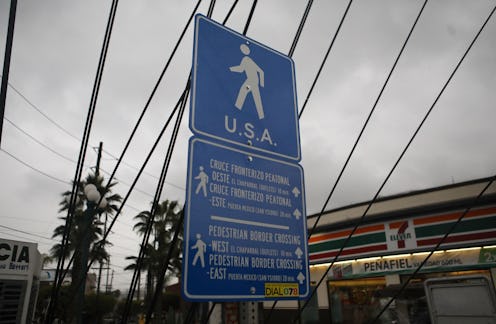
On Tuesday, the president of the United States repeatedly advocated for funding for the construction of a border wall between the United States and Mexico. In pushing for its construction, Trump claimed his wall would prevent a "medical problem" by supposedly stopping the spread of disease. But Trump's claim is patently inaccurate, as there is no evidence to bolster his suggestion that migrants present a medical hazard to the United States, NBC reported.
As The Hill described, Trump made one of several remarks about the issue during a bill signing ceremony on Tuesday. "One of the problems that people don't talk about, you have a tremendous medical problem coming into our country," Trump asserted. "Tremendous problems. People don't want to talk about it."
Trump also made a similar suggestion on Twitter when ruminating on his then-upcoming meeting with Senate minority leader Chuck Schumer and House minority leader Nancy Pelosi. "They [Schumer and Pelosi] want Open Borders for anyone to come in. This brings large scale crime and disease," the president wrote in part.
While Trump appears to feel strongly about the supposed connection between migration and disease, facts do not back up his claim. Indeed, a December 2018 study from the UCL–Lancet Commission on Migration and Health, found that migrants do not play a role in spreading disease to other countries, NBC indicated when summarizing the report's findings.
Dr. Paul Spiegel, the director of the Center for Humanitarian Health at the Johns Hopkins School of Public Health and a member of the aforementioned UCL–Lancet Commission on Migration and Health, echoed these sentiments when speaking with NBC on Dec. 5. "There is no evidence to show that migrants are spreading disease," Spiegel emphasized. "That is a false argument that is used to keep migrants out."
NBC further reported that the study found that migrants are actually less likely to perish from a variety of diseases, including cancer, heart disease, and respiratory disease, than residents of their host countries. The study did indicate (via NBC) that migrants are more vulnerable to HIV, hepatitis, and tuberculosis, but these diseases typically remain within a given migrant community and usually aren't spread to the larger host country population.
Finally, NBC reported that the report also pointed out that migrants actually substantially contribute to combating disease in their host countries. Indeed, a recent report from the Journal of the American Medical Association found that 16 percent of health care workers in the United States were born in another country.
Other organizations also report similar findings about migration and health. Indeed, the World Health Organization (WHO)'s Regional Office for Europe indicated on its website that there is not a linkage between migration and the spread of disease, writing, "In spite of the common perception of an association between migration and the importation of infectious diseases, there is no systematic association."
The WHO also added that, if diseases are imported to other countries, travelers are typically the vectors — not migrants. "Experience has shown that, when importation occurs, it involves regular travelers, tourists or health care workers rather than refugees or migrants," the WHO wrote.
Overall, evidence suggests that Trump's claims about the linkages between migration and the spread of disease are incorrect. It remains to be seen whether Trump will continue to employ this inaccurate rhetoric when advocating for the construction of a U.S.-Mexico border wall.